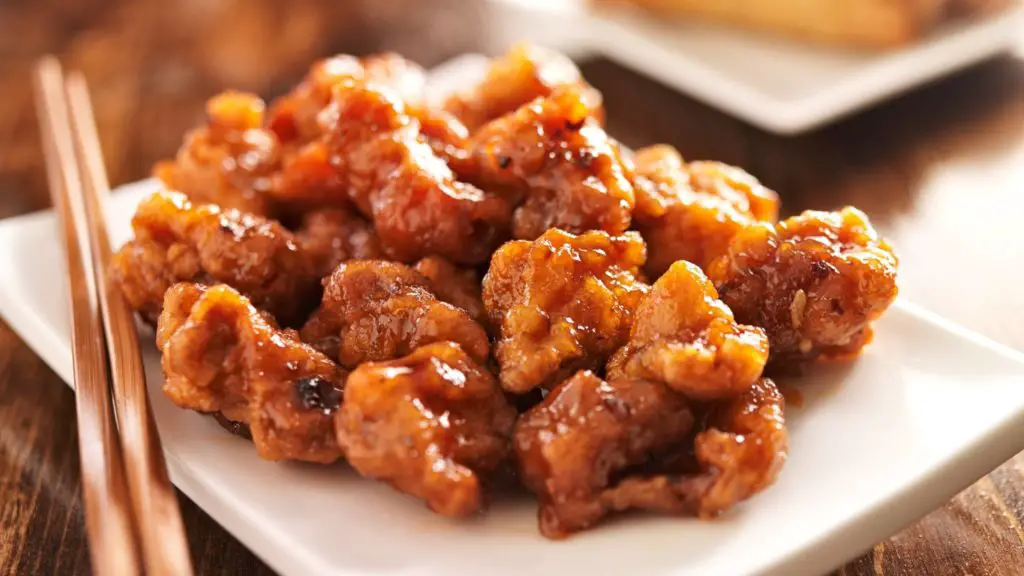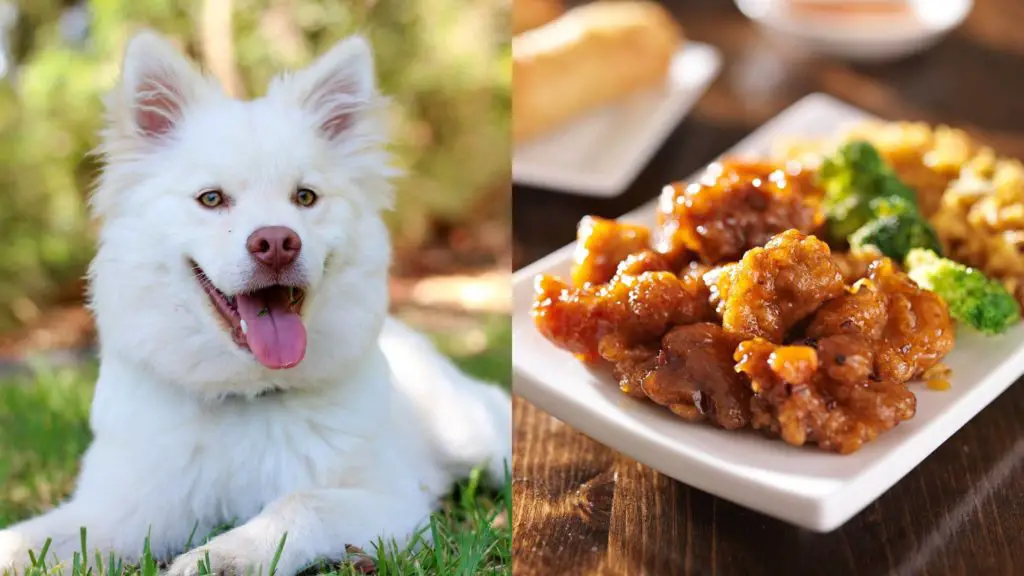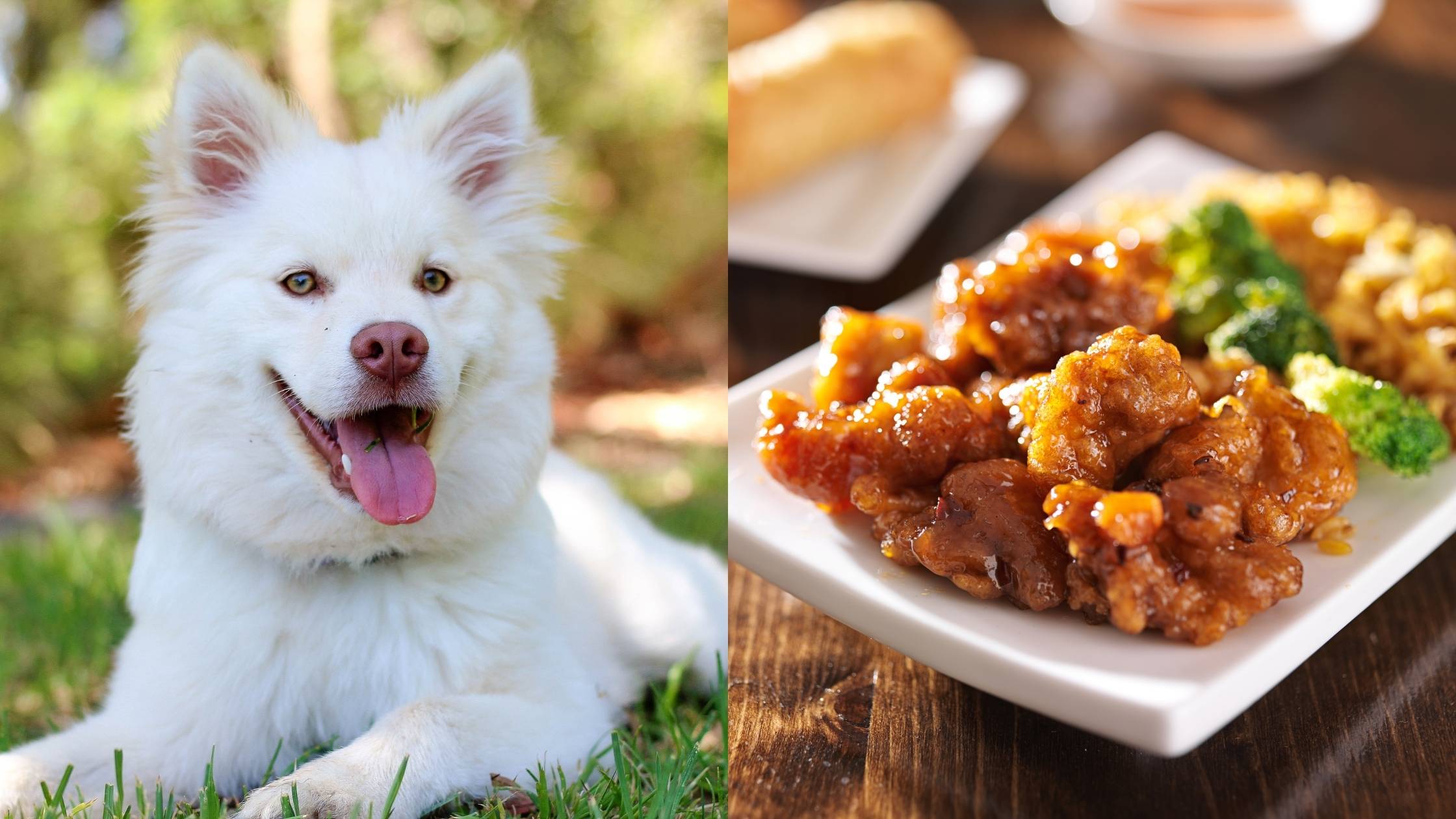Last Updated on 11/16/2021 by Veronica Jones
If your household is a fan of Chinese food, chances are you’re familiar with the popular orange chicken dish that can be bought as a takeout or made at home.
Dog owners love to share our treats with pets, but can dogs eat orange chicken too? Is it safe?
Let’s take a look at what is in orange chicken first.
What is orange chicken?
Orange chicken is an Asian fast food consisting of battered and fried chicken coated in a sweet orange and chili sauce. It’s sweet, sticky and tangy all at the same time.
The orange sauce is made from orange juice, soy sauce, ginger, garlic and chili flakes. The chicken is cut into bite-sized pieces then fried until crispy.
The main ingredients in orange chicken are:
• Skinless chicken
• Salt
• Pepper
• Cornstarch
• Flour
• Egg
• Oil
• Sugar
• Orange juice
• White distilled vinegar
• Soy sauce
• Sesame oil
• Garlic
• Ginger
• Chili flakes

Can dogs eat orange chicken?
No, it’s not recommended that dogs eat orange chicken because of the harmful ingredients that the sauce contains. The only safe way to feed orange chicken to your furry friend is by making the sauce yourself and leaving out harmful ingredients.
Is orange chicken bad for dogs?
Even small amounts of orange chicken can cause your pup to experience digestive problems such as diarrhea and vomiting. The high sugar levels in oranges can also sauce GI upset if your pup eats too many of them.
Cooked bones have been known to cause intestinal blockages in canines, which can be fatal.
Many Chinese dishes contain garlic and onions, including orange chicken. These ingredients are highly toxic to dogs because they damage red blood cells that are responsible for carrying oxygen around the body. If your dog consumes any member of the Allium family (garlic, onions, shallots, chives and leeks) he could develop anemia.
Sugar – foods that contain high amounts of sugar shouldn’t be given to dogs because it’s bad for a dog’s teeth and can cause cavities and weight gain, which could lead to diabetes. Some Chinese dishes contain more sugar than salt.
Spices – a canine’s digestive system is very sensitive, which means they react badly to spices as their bodies can’t process them. Spices used in human food often cause gastrointestinal upset, giving your dog symptoms of vomiting, diarrhea, dehydration and abdominal pain.
Oils and fats – the chicken in orange chicken is cooked in oils and fat, which are extremely bad for your pup’s health. If your dog consumes too many foods that are high in fat, it could trigger pancreatitis. This condition is painful to dogs as the pancreas become inflamed.

Can Dogs Have Panda Express Orange Chicken?
Does your pup give you those irresistible puppy dog eyes every time you order some Asian fast food from Panda Express?
Panda Express is a dog-friendly restaurant with plenty of outdoor tables, however the dishes they serve are not suitable for doggy consumption. This includes orange chicken, pacific chili shrimp and beeeggplant tofu.
What happens if my dog eats too much orange flavored chicken?
Too much orange chicken in a dog’s diet can lead to serious health problems. One or two pieces are unlikely to cause them harm unless the sauce contains garlic which is dangerous to canines. If your pup is sick or experiences stomach upset from eating orange chicken, it’s best to only feed him a bland diet for the next 24-48 hours.
Salt poisoning
Canines should not consume more than 1.5 grams of salt per pound of their body weight. Chinese food, including orange chicken can contain extremely high levels of salt. The signs of salt poisoning include drinking lots of water, confusion, extreme thirst and urination, convulsions or a lack of energy and appetite. Salt poisoning requires immediate veterinary advice. Treatment will vary depending on how much salt has been consumed. For mild cases, allowing your dog to drink small amounts of fresh water regularly will help your dog to naturally flush the salt out of his body. In severe cases, your dog may be admitted to the hospital for oxygen and IV fluid therapy.
Pancreatitis
High-fat diets can cause a dog’s pancreas to become inflamed.
Common signs that your pup is suffering from pancreatitis includes:
• Vomiting
• Diarrhea
• Loss of appetite
• Fever
• Lethargy
• Abdominal pain
Pancreatitis can be life-threatening in dogs and should be treated as a medical emergency.
Weight gain and obesity
In general, weight gain in dogs is caused by a high calorie and fat diet and not enough exercise. Dogs who are obese are at higher risk of certain types of cancer, diabetes and heart disease.

Are there any health benefits in orange chicken for dogs?
Chicken is a good source of protein for canines, however chicken bones and ingredients that are usually cooked with chicken can cause your pup harm. If you want to serve chicken to your pooch, cooked and boneless chicken is the safest.
Can puppies eat orange chicken?
Puppies should not be fed orange chicken because their tummies are extremely sensitive. If your pup consumes orange chicken they may experience sickness and diarrhea. Onion and garlic poisoning can also be fatal to canines in extreme cases so any food that contains these harmful ingredients should be kept well away from your pet.

Dogs and orange chicken
Whilst tiny amounts of orange chicken or kung pao chicken are unlikely to cause significant harm to your pup, it’s not recommended that you feed it to him. There are a lot healthier human foods that you can give your pet that won’t make him sick or cause long term health issues such as obesity. Always remember to seek veterinarian advice before introducing new foods to your dog’s diet.
Looking for More Great Articles About What Your Dog Can (or Can’t) Eat?
- Can Dogs Eat Capers? Are they Dangerous?
- Can Dogs Eat Rice Krispies, or Rice Krispie Treats?
- Can Dogs Eat Rose Petals? Are they Toxic?
- Can Dogs Eat Basil? Is it Safe?
- Can Dogs Eat Coleslaw? What are the Risks?
Reference list
- AKC “pancreatitis in dogs” https://www.akc.org/expert-advice/health/pancreatitis-in-dogs/ Accessed 28th October 2021
- Hillspet “diabetes in dogs” https://www.hillspet.co.uk/dog-care/healthcare/dog-diabetes-mellitus Accessed 28th October 2021
- Pet poison helpline “salt poisoning in dogs” https://www.petpoisonhelpline.com/poison/salt/ Accessed 28th October 2021
- VCA Hospital “garlic poisoning in dogs” https://vcahospitals.com/know-your-pet/onion-garlic-chive-and-leek-toxicity-in-dogs Accessed 28th October 2021

